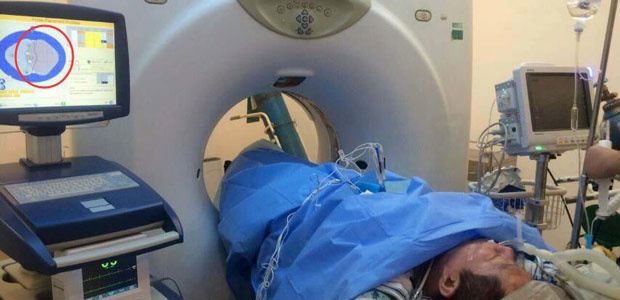Patients with pancreatic cancer or liver cancer are typically offered surgical removal to gain the best chance for long-term survival. Unluckily, some of these, up to 30-40%, will present with middle and advanced cancer not amenable to surgical resection since the tumors located near critical structures and major blood vessels. This patient group typically undergoes chemotherapy or radiation therapy with an anticipated median survival of 10-12 months.

Nanoknife Brings New Hope for Inoperable Pancreatic and Liver Tumors
For patients with inoperative or difficult-to-reach pancreatic or liver tumor, nanoknife brings new hope with its unique advantages of preservation of essential structures. It is a minimally invasive therapy using electrical currents to destroy cancer cells, applicable to liver cancer, pancreatic cancer and metastatic tumors in liver and pancreas.
While the patient is under general anesthesia, 2 to 6 probes are strategically inserted around a tumor under ultrasound or CT guidance. Then, nanoknife system sends electrical pulses or currents between each set of needles to puncture permanent nanometer-sized holes into the tumor. This process, called irreversible electroporation (IRE), causes the cancer cells to be unbalanced and triggers cancer to death.
The electrical pulses are contained between the electrodes, minimizing damage to surrounding healthy cell tissue, blood vessels and other essential structures. After the tumor is destroyed, the body naturally eliminates the dead cancer cells, which are replaced by healthy cells.
Benefits of Nanoknife
*No open surgery
*Less damage to healthy tissue
*Minimal postoperative pain
*Fewer side effects
*Short hospital stay
*Quick post-operative recovery
*Ability to repeat the procedure if new tumors develop
Cases of Nanoknife at St. Stamford Modern Cancer Hospital Guangzhou
St. Stamford Modern Cancer Hospital Guangzhou has successfully performed nanoknife on several cases including pancreatic cancer, liver cancer and metastatic liver tumor. It is a breakthrough to help more inoperable cancer patients to defeat cancer and have an opportunity to achieve radical therapeutic effect.
Nanoknife, My First Choice for Inoperable Hepatic Tumor

Nanoknife was performed for Mr. Pan
Name: Mr. Pan
Disease: Liver Cancer
Nationality: Vietnam
Mr. Pan, 51 years old, was diagnosed with primary liver cancer stage II with
size of 4*4.3cm in July, 2016. And in November, he was admitted at our hospital
to take minimally invasive treatment. Due to the location of his hepatic tumor,
closing to stomach and hepatic major vessel, surgery or normal ablation would
damage them or would not remove the tumor completely. Nanoknife became a better
option for him. After performing Nanoknife, he is in good condition and tumor
has disappeared. Read more
Nanoknife Gives Confidence and Hope to Stage IV Colorectal Cancer Patient with Liver Metastasis

Prakotharn Mr. Denchai
Name: Prakotharn Mr. Denchai
Disease: Colorectal Cancer with Liver Metastasis
Nationality: Thailand
Prakotharn Mr. Denchai, a colorectal cancer stage IV patient, is 43 years
old. After surgery in Thailand hospital, cancer recurred with hepatic metastasis
in mid-2015. The hepatic tumor was located between the right branch of portal
vein and right hepatic artery, which cannot be removed by surgery, so he only
took chemotherapy which brought him serious side effects instead of good
efficacy. Later, he was admitted to our hospital and took nanoknife. Now, his
condition is well under control and tumor marker has backed to normal. Read more
*Surgery, in addition to the appropriate chemotherapy and radiotherapy, are effective in treating early cancer, but certain patients in late stage of cancer may not be tolerate surgery well as they can be relatively weak. A combination of carefully planned minimally invasive therapy, chemotherapy or radiotherapy can effectively reduce the side effects and discomfort of treatment and may help patient get better efficacy.













 viber
viber